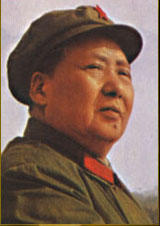
Poor Nicholas Kristof. He was assigned the task of reviewing Mao: The Untold Story by Jung Chang and Jon Halliday. It is a searing indictment of Mao's career that makes a persuasive case for ranking him among the most destructive figures in the history of mankind. But Kristof, like many lefties, has a soft spot in his heart for the old monster, and squirms mightily in an attempt to at least partially justify Mao's many crimes against humanity.
To give Kristof some credit, he does not try to deny or minimize the horrors perpetrated by Mao, although he does suspect that the authors might be exaggerating some of them. The evidence is too overwhelming. But he does take a cue from Lenin's infamous observation that to make an omelet you have to break some eggs. In the case of Mao there may have been as many as seventy million eggs crushed, but Kristof can still write:
I agree that Mao was a catastrophic ruler in many, many respects, and this book captures that side better than anything ever written. But Mao's legacy is not all bad. Land reform in China, like the land reform in Japan and Taiwan, helped lay the groundwork for prosperity today. The emancipation of women and end of child marriages moved China from one of the worst places in the world to be a girl to one where women have more equality than in, say, Japan or Korea. Indeed, Mao's entire assault on the old economic and social structure made it easier for China to emerge as the world's new economic dragon.
Perhaps the best comparison is with Qinshihuang, the first Qin emperor, who 2,200 years ago unified China, built much of the Great Wall, standardized weights and measures and created a common currency and legal system - but burned books and buried scholars alive. The Qin emperor was as savage and at times as insane as Mao - but his success in integrating and strengthening China laid the groundwork for the next dynasty, the Han, one of the golden eras of Chinese civilization. In the same way, I think, Mao's ruthlessness was a catastrophe at the time, brilliantly captured in this extraordinary book - and yet there's more to the story: Mao also helped lay the groundwork for the rebirth and rise of China after five centuries of slumber.
I wonder if Kristof would be so charitable to the capitalist "robber barons" of the late nineteenth century upon whose efforts and machinations the West's prosperity was built.I doubt it.
No comments:
Post a Comment